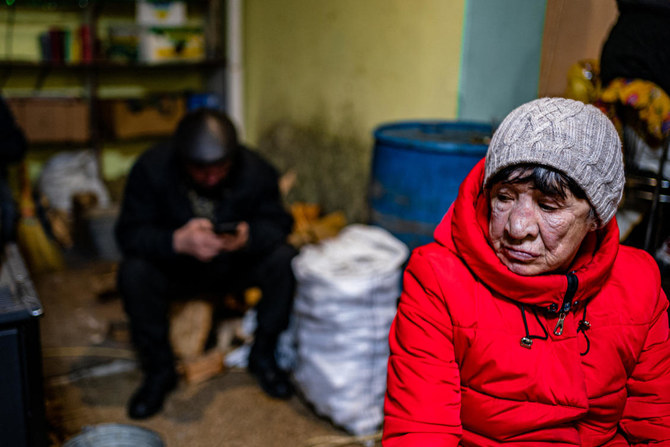DONETSK PROVINCE, Ukraine: The situation in the Ukrainian city of Bakhmut was “extremely tense” on Tuesday, the commander of Ukrainian ground forces said, as Russian troops besieging it stepped up their assault in a bid to encircle it.
Russia is trying to cut the Ukrainian defenders’ supply lines to the city, the scene of some of the war’s toughest fighting, and force them to surrender or withdraw. That would give Russia its first major prize in more than half a year and open the way to the capture of the last remaining urban centers in the Donetsk region.
“Despite significant losses, the enemy threw in the most prepared assault units of Wagner, who are trying to break through the defenses of our troops and surround the city,” Ukraine’s Col. general Oleksandr Syrskyi was quoted as saying on a military messaging platform.
Ukraine’s military said earlier Russia had strengthened its forces in the Bakhmut area and was shelling settlements around the city.
“Over the past day, our soldiers repelled more than 60 enemy attacks,” the military said early on Tuesday referring to Bakhmut and nearby eastern areas, adding that Ukrainian forces repelled Russian attacks on the villages of Yadhidne and Berkhivka, on the northern approaches to Bakhmut.
Ukrainian military analyst Oleh Zhdanov said Russian forces had driven a wedge between those villages as they tried to cut the road west to Chasiv Yar.
“The southern part of Bakhmut is the only area which can be described as under Ukrainian control. In all other districts, the situation is unpredictable,” he said in a video commentary, adding: “It is impossible to say where the front line lies.”
Ukrainian soldiers in Donetsk region hunkered in muddy trenches after warmer weather thawed out the frozen ground.
“Both sides stay in their positions, because as you see, spring means mud. Thus, it is impossible to move forward,” said Mykola, 59, commander of a Ukrainian frontline rocket launcher battery, watching a tablet screen for coordinates to fire.
The spring thaw, known as the rasputitsa, has a history of ruining plans by armies to attack across Ukraine and western Russia, turning roads into rivers and fields into quagmires.
Reuters saw several military vehicles stuck in mud. In a zigzag trench, Volodymyr, a 25-year-old platoon commander, said his men were prepared to operate in any weather.
“When we’re given a target that means we have to destroy it.”
Russia, its forces replenished with hundreds of thousands of conscripts, has intensified its attacks along the eastern front but its assaults have come at a high cost, Ukraine and its allies say.
“Vicious battles are going on there. The command is doing everything it can to stop the enemy from advancing through our territory,” Serhiy Cherevatyi, a spokesperson for Ukraine’s eastern military command, told Ukrainian television.
Russia said its forces had destroyed a Ukrainian ammunition depot near Bakhmut and shot down US-made rockets and Ukrainian drones.
Reuters could not verify the battlefield reports.
The Russian defense ministry said the United States was planning a provocation in Ukraine using toxic chemicals. There was no immediate US response.
Yellen in Kyiv
US Treasury Secretary Janet Yellen became the latest senior Western official to visit the Ukrainian capital, promising assistance and more measures to isolate Russia after meetings with President Volodymyr Zelensky and other officials.
Her boss, President Joe Biden, went there a week ago to mark the first anniversary of Russia’s invasion of Ukraine.
“America will stand with Ukraine as long as it takes,” Yellen, flanked by sandbags at the Cabinet office, told Ukrainian Prime Minister Denys Shmyhal.
Yellen announced the transfer of the first $1.25 billion from the latest, $9.9 billion tranche of US economic and budget assistance, and visited a school where teacher salaries are reimbursed with US support.
She also backed completion of a fully financed program for Ukraine with the International Monetary Fund by the end of March.
Ukraine’s forces have mostly focused on holding defensive positions in recent weeks but are expected to attempt a counter-offensive later in the year with new weapons from the West.
Zelensky pushed again for F-16 fighter jets that his Western allies have been reluctant to provide.
“We will be able to completely protect our skies when the aviation taboo is fully lifted in relations with our partners,” Zelensky said in his nightly radio address.
The Feb. 24 first anniversary of Russia’s invasion saw both sides trying to demonstrate resolve for a second year of war.
Russian President Vladimir Putin gave a speech in which he abandoned the last remaining nuclear arms control treaty with the United States but announced no major initiatives to change the war’s course.
He was upstaged by Biden, who journeyed to Kyiv and gave a landmark speech of his own in Warsaw.
Ukraine’s outnumbered troops repelled Russia’s attack aimed at taking the capital early in the war and later recaptured substantial territory. Russia still occupies nearly a fifth of Ukraine which it claims to have annexed.
















